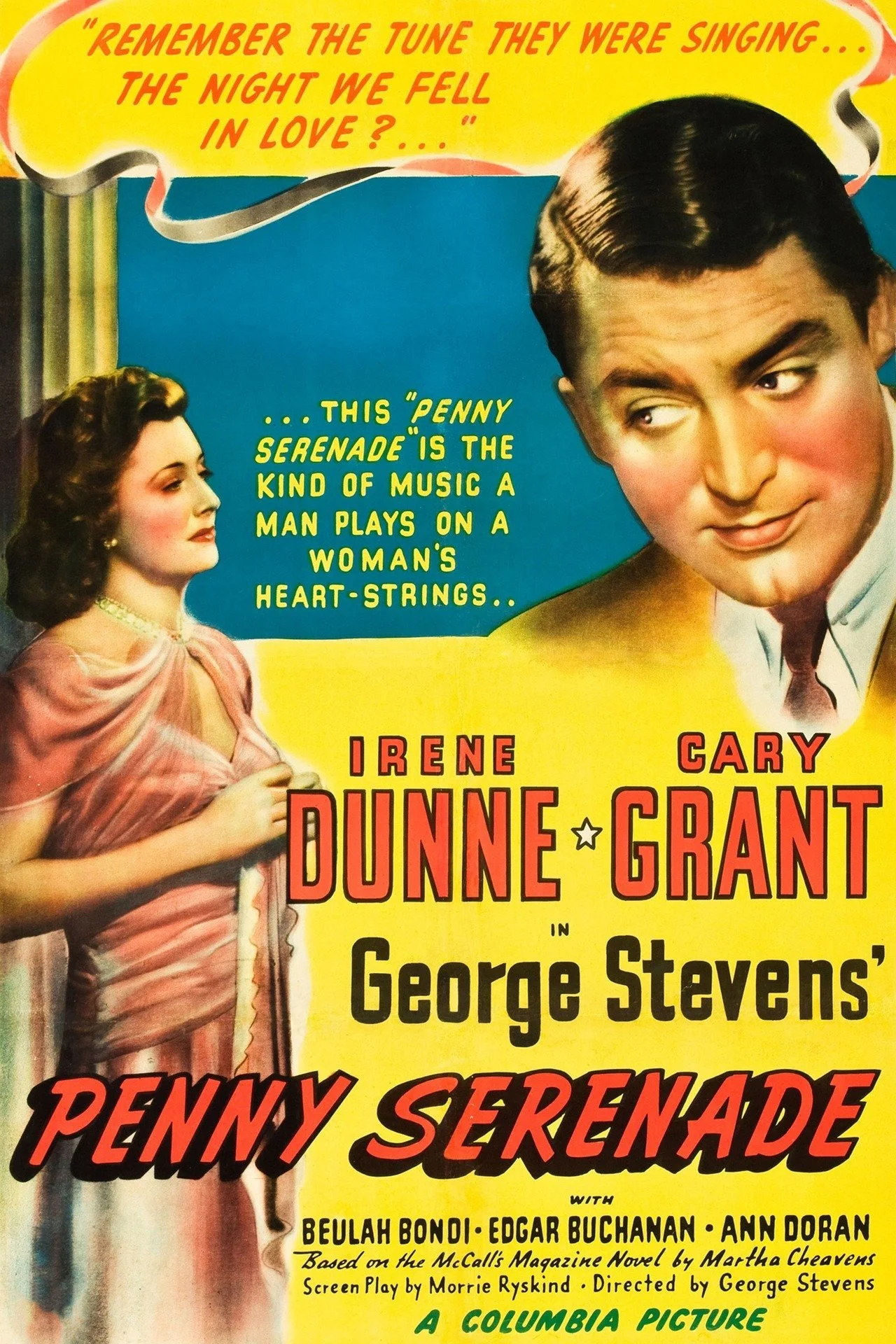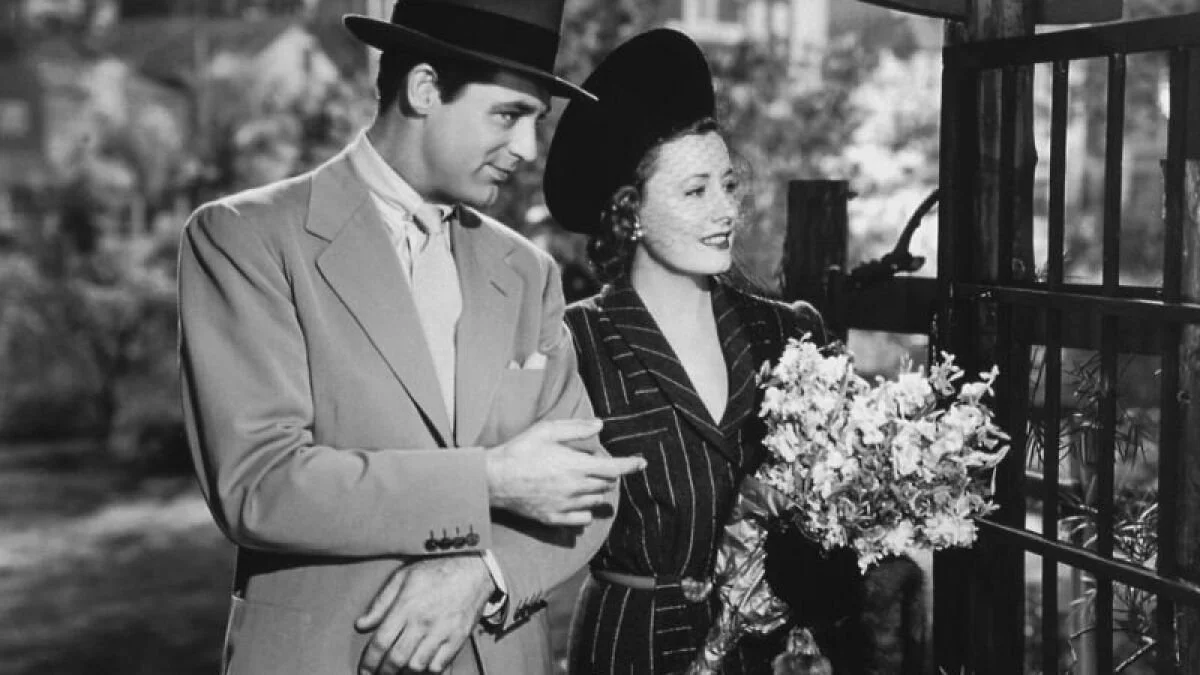Irene Dunne & Cary Grant: Penny Serenade (1941, dir. George Stevens, US) by Matt Olsen
The final pairing of Irene Dunne and Cary Grant bears almost no resemblance to their earlier two films, The Awful Truth and My Favorite Wife – which, as returning readers may recall, are effectively the same movie. In those films, Dunne and Grant trade volleys of sharp-witted dialogue in an escalating battle for position over the other. The movies have a near-anarchic approach in their pursuit of the laugh. In short, they are comedies. Penny Serenade is not. It’s a classic Hollywood melodrama weeper as unquestionably calculating as it is effective.
On that note, the movie never attempts to hide its means or motives. The emotional dominancy of the story is present from the very beginning: Dressed in black, Julie Adams (Dunne) prepares to leave her husband and home in reaction to some unspoken sadness. When the couple’s longtime friend, Applejack (more on him later) endeavors to change her mind, she explains, “We don't need each other anymore. When that happens to two people, there's nothing left.” She temporarily delays her departure to play a few select records from her collection, each of which is a wellspring to another memory of the couple’s life in happier times. The entire movie, then, rests on memory and nostalgia as a passing escape from the present and all its inherent woes, set to music. That the film never sinks into a quicksand-like soup of mawkishness is a tribute to both its director, George Stevens, who would later go on to make classics like Shane and A Place in the Sun, and the uniformly terrific performances of Dunne and Grant alongside Edgar Buchanan.
The flashbacks begin, naturally, at Julie’s (Dunne) first meeting with Roger (Grant). He spies her through the window of a record store (3 Records for 88 Cents!) as the song “You Were Meant for Me” unsubtly oozes from a sidewalk speaker. There’s a bit of light comedy as Roger struggles to make an introduction but, from that point on, the scenes of their burgeoning relationship are principally naturalistic in tone. Of course, Dunne and Grant are UN-naturally charismatic and charming human specimens so there’s no getting around that but there aren’t the overly constructed, too-cute bits such as one might expect. It’s tempting to attribute that to the level of ease and comfort the two must have reached by their third movie in four years but that shouldn’t be read to discount their abilities as actors.
Cary Grant, in particular, evinces a more vulnerable performance here than is typical for him. His magically appealing confidence is always present but it’s matched here by a fomenting uncertainty. This film marked one of only three times that Grant was nominated for an acting Oscar. He’s excellent throughout, but it’s not difficult to point to one scene that probably pushed the arrow in his favor. Within a judge’s chambers (judges play significant roles in all three of the Dunne / Grant films), Roger receives an unfavorable decision from the court. Though it will inevitably cause him and Julie a painful loss, he initially seems poised to accept the ruling. He makes several false starts before he manages to raise a defense. When it comes, it’s a bare emotional appeal; awkward, honest, and at odds with the perfectly coiffed, chin-dimpled Cary Grant seen elsewhere. Stevens shoots the scene in long takes and at a distance which renders the effectiveness of the performance even more impressive.
Dunne is as compelling in Penny Serenade as she is in everything else and brings the same level of openness as Grant. Once again, the scales balance. Though the rhythm is as different as it could be from screwball comedy, the two find similar moments of connection through small gestures, asides, glances, etc. Basically, she’s every bit his equal again and only space disallows me from rhapsodizing on her further. Next week!
It’s also incumbent to bring attention to the character of Edgar Buchanan’s Applejack. A friend of Roger’s from his early days a cub reporter, there’s never been a more literal example of a Supporting Actor. Julie and Roger each employ, lean on, and outright use him in times of need. And he always complies. There’s a fantastic sadness inherent in him that’s impossible to ignore. His bearing screams discomfort and loneliness but it’s masked by his soft features and accommodating nature. It’s as if in the absence of a great love in his own life, he has consigned himself to living on the fringes of Julie and Roger’s marriage. It’s a heartbreaking character played with a similar depth of feeling as Ernest Borgnine in Marty.
There are only two missteps, each forgivable. The first is in the casting of a particular child actor who is adequate in some moments but overbearingly treacle in too many others. As a viewer, it’s not an insurmountable issue but, well, it is distracting. There’s another arguable flaw in the very ending which is much too neat. It’s especially dissatisfying since the film takes so many chances and reaps rewards with scenes of genuine turmoil and unease.
I’ll invite the readers to overlook those couple of poor decisions and focus on the ninety-nine per cent of the movie that embraces the ups, downs, and general enigma of actual existence. Albeit in a hyper-actuated emotionally manipulative presentation.
Matt Olsen is a largely unemployed part-time writer and even more part-time commercial actor living once again in Seattle after escaping from Los Angeles like Kurt Russell in that movie about the guy who escapes from Los Angeles.


